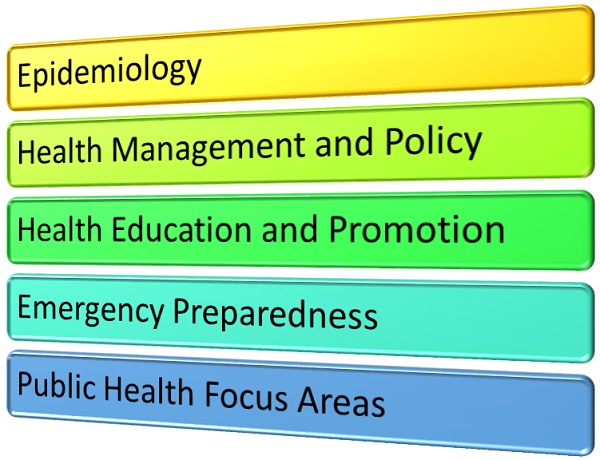A Master of Public Health (MPH) degree, one of the highest paying master’s degrees, is often considered an interdisciplinary or multidisciplinary degree. The coursework involved in one such program may draw from such disparate areas of study as health analytics and biostatistics, health economics and grant writing, counseling and violence intervention and more. Since public health is such a broad field, many MPH degree programs offer course sequences or formal concentration tracks in different areas of specialization within the field of public health. Some of the areas of specialization you may wish to consider include epidemiology and biostatistics, health management and policy, health education and promotion, emergency preparedness and specific focus areas within public health.
Epidemiology and Biostatistics
Choosing a public health concentration requires you to consider your interests and strengths, as well as what kind of difference you want to make by working in public health. One of the most popular specializations of public health is epidemiology, the study of disease patterns and of the incidence, spread and distribution of disease. Understanding epidemiology is crucial to controlling and containing the spread of infectious diseases, so working in this field certainly allows you the opportunity to make a difference in the health of the general public. To analyze and understand disease patterns, you need to use quantitative methods of inquiry, including biostatistical techniques and methodologies.
If you decide to study epidemiology, you should be prepared for both coursework now and job duties in your future career that require more extensive quantitative skills in statistics and data analysis.
Health Management and Policy
If you’re more interested in the administration and development of healthcare policies – such as laws and regulations that help improve public health by removing barriers to care – then a specialization in health management and policy might be for you. While effective policies and well thought out regulations improve health access and outcomes, more policy does not always equal better health outcomes. Instead, imposing too many regulations can sometimes result in wasted resources and significant burdens on healthcare facilities and providers. That’s why students who specialize in health management and policy learn to assess both societal public health needs and the cost-effectiveness of regulations. Weighing these two aspects allow them to develop and advocate for smart public health policies that make a positive difference in health access and outcomes with minimal negative consequences.
After earning your MPH with a concentration in health management and policy, you might end up holding a job title such as medical and health service manager, health policy analyst, health policy lobbyist or public health outreach manager.
Health Education and Promotion
A lot of public health issues could be improved just by educating the public about healthy lifestyles and the risks, symptoms and interventions available for medical conditions. If you decide to specialize in health education and promotion, you will acquire the skills to serve as that educational link between the public and the healthcare industry. Your job responsibilities might encompass developing programs and campaigns to promote health knowledge within the community and instructing individual patients on how to manage their medical conditions and get the healthcare services they need.
Where you work as a health educator determines your job duties. A health educator hired by a healthcare facility will spend more time working with patients, while one working for a public health agency or nonprofit organization will do more community outreach.
Emergency Preparedness and Disaster Management
IMAGE SOURCE: Pixabay, public domain
Emergencies and disasters pose a big threat to public health. When you choose to pursue a specialization in emergency preparedness as part of your MPH, you will develop the knowledge and skills to help manage and coordinate a response to public health threats that range from natural disasters and infectious disease epidemics to acts of terrorism and large-scale accidents. Determining where and how to deploy resources – and what resources are most needed – is difficult in the face of a heartbreaking and unpredictable emergency situation, but being able to think rationally and act quickly and calmly can save countless lives.
With a background in this specialization of public health, you might rise to the role of emergency preparedness director employed by a government agency, a hospital or medical facility or a nonprofit organization.
Public Health Focus Areas
When an issue in public health is severe enough to become a major topic of exploration, MPH programs will often integrate a series of courses relevant to understanding and addressing this challenge. For example, researchers have uncovered glaring health disparities – such as unequal access to health services and statistically significant differences in health outcomes – in the treatment of patients who are part of racial or ethnic minority populations. You might choose to specialize your public health studies by pursuing a concentration in minority health and health disparities if you aim to understand the factors that lead to these disparities and effect change by pushing for new policies, training practices and other efforts to remove these disparities.
Other focus areas within the sphere of public health address the social aspects involved in healthcare specialties with a strong connection to public health, such as mental and behavioral health and maternal and child health.
Related Resources:
What Degree Does a Public Health Nurse Need?


